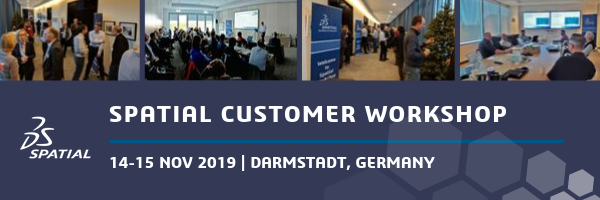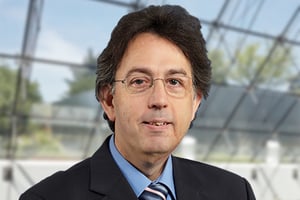
Limited space available! Register today!
About the Workshops
This is an educational event that focuses on technical topics that will help you innovate out of the box. You will learn best practices, experience new capabilities in the software, and customize our software components to achieve your goals.
Discover what is new at Spatial, learn about the latest features, and gain insight about future product plans. Talk and work directly with Spatial technical experts! Share your requirements for success.
Date: 14 - 15 November 2019
Venue: Fraunhofer Institute for Computer Graphics Research in Darmstadt, Germany
Cost: Free - registration required.
Agenda:
DAY ONE - 14 November 2019
8:30 – 9:00– Arrive for the day
9:00 – 9:15 – Welcome Address
9:15 – 10:15 – Spatial Today and Tomorrow
10:15 – 10:45 – Coffee break
10:45 – 11:30 – Keynote Presentation, Dr. Stork, see more information below
11:30 – 12:00 – Spatial Customer Success Framework
12:00 – 13:00 – Lunch
13:00 – 13:30 – Portfolio Overview
13:30 – 14:15 – 3D ACIS Modeler Update
14:15 – 15:00 – 3D InterOp Update
15:00 – 15:30 – Coffee break
15:30 – 16:15 – CGM Core Modeler Update
16:15 – 17:00 – Visualizer and 3D Precise Mesh Update
17:00 – 18:00 – Networking with food and drinks
DAY TWO - 15 November 2019
8:30 – 9:00 – Arrive for the day
9:00 – 9:30 – Innovating Strategic Direction
9:30 – 10:00 – Direction for the future
10:00 – 10:30 – Coffee break
10:30 - 11:00 - Direction for the future (continued)
11:00 - 11:15 – Wrap up
11:15 – 13:00 – One on One Sessions - contact your account manager to schedule a session
 KEYNOTE SPEAKER: Professor André Stork
KEYNOTE SPEAKER: Professor André Stork
Multi-Material 3D Printing: Challenges for CAD Representations
Modern 3D printers allow for using different materials for one object in a single printing job. The most sophisticated ones can deposit different materials per voxel (volume element), thus, creating virtually smooth transitions between materials (smooth gradients). In most cases, each voxel can only be filled with one of the materials the printer currently has in use, so called primary materials. However, by varying the materials over a region of voxels, smooth gradients between regions of different behavioral characteristics can be generated. Material gradients in objects can realize function integration in an object but also contribute to the stability and durability of an object since multi-material objects consisting of a discrete set of larger material chunks tend to crack at their interfaces.
The possibility to print volumetric material variations poses challenges to traditional boundary representations (BReps) used in CAD systems and CAD kernels. Usually, it is only possible to assign one material to a BRep, possibly to a body, lump, or shell. Considering the fact that multi-material printers deposit tens of millions of voxels per cubic centimeter, it is impractical to model each voxel with these topological elements. Thus, alternatives to model material gradients in the CAD stage are sought.
The talk will present and discuss alternative approaches and their application beyond the geometric modeling phase.
About Prof. Stork:
André Stork is head of the Competence Center for Interactive Engineering Technologies and honorary professor at Technische Universität (TU) Darmstadt.
André Stork studied computer science and received his doctoral degree from the TU Darmstadt in 2000. The topic of his dissertation was “3D interaction and visualization techniques for user centered modelling applications”.
In 1992 he received his diploma in computer science. From 1992 to 1994, he worked as a researcher at the Computer Graphics Center (ZGDV e.V.), Darmstadt, in image classification, neuronal networks, image analysis and animation. Since 1994 he has been working in the department for Interactive Engineering Technologies (former: Industrial Applications), first as a researcher and since 2002 as head of the department. His major research interests are geometry modelling and shape processing, 2D/3D interaction techniques, simulation, and scientific visualization.
André Stork has authored and co-authored more than 200 papers in the field of his various interests. He has been a member of the program committee or acted as a reviewer in many international conferences, workshops, and journals. He lectured “Computer Graphics III” and has lectured “Geometric Methods in CAD/CAE” at TU Darmstadt.
André Stork is a member of IEEE, Eurographics, ACM, Gesellschaft für Informatik (GI), and VDI.












